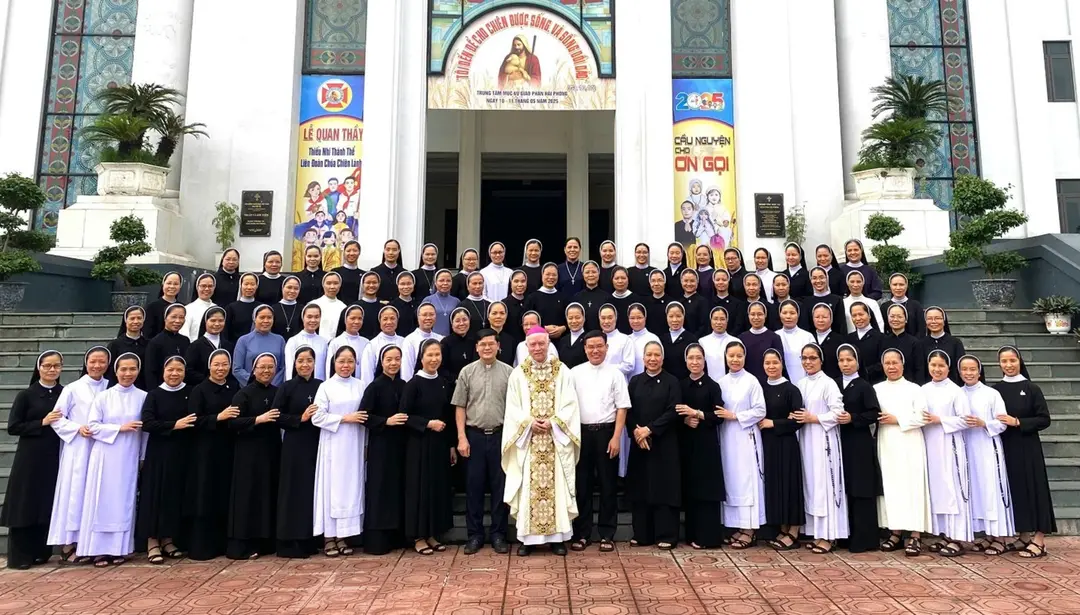More than 100 women religious from Northern Vietnam completed a weeklong formation course designed to strengthen their capacity to guide candidates in religious life, amid growing calls for more professional and spiritually rooted formation within congregations.
Held from May 11 to 18 at the Pastoral Center of the Diocese of Hải Phòng, the intensive training brought together 108 sisters from 10 congregations, one monastery, five associations, one society of apostolic life, and one institute of consecrated life.
It was organized by the Executive Committee of the Union of Women Religious Congregations of Northern Vietnam, according to the Vietnamese Bishops’ Conference.
“With the hope that each congregation’s trainees may receive appropriate and quality formation,” the committee said in a statement, “we organized this ongoing formation course for formation leaders.”
The program focused on three core areas: deep psychology and anthropology in religious formation, spiritual accompaniment centered on spousal love for Christ, and renewed engagement with the evangelical counsels of poverty, chastity, and obedience.
Sr. Teresa Vũ Thị Ảnh, a member of the Lovers of the Holy Cross of Phát Diệm and an expert in the psychology of consecrated life, opened the course with a comprehensive session on the psychological and anthropological dimensions of religious formation.
Drawing on years of teaching and accompaniment, she explored the role of emotional memory, the distinction between ideal and real selves, and the conscious and unconscious influences that shape personal and communal life.
Sr. Teresa emphasized the importance of discerning personal desires and values in formation. “All of this,” she said, “aims to help us adopt a balanced attitude toward life’s challenges, discover genuine motivations, and recognize the psychological dynamics we need to live our vocation in an integrated and mature way.”
The second part of the course was led by Bishop Joseph Đinh Đức Đạo, an educator and formation specialist, who called on formators to guide religious toward a deep and fervent relationship with Christ, grounded in “spousal love.”
“The purpose and vision of formation is to help candidates live fervently in their vocation,” Bishop Đạo said. He described this as a return to the source of vocation, which he defined through five principles: “presence; longing; conformity with Christ; self-offering; and pleasing the beloved – following God’s will.”
He also addressed the difficulties faced by many formators, pointing to the need for healing and holistic development. “It is necessary to renew from the roots, shaping the whole person by healing inner wounds and breaking free from harmful habits,” he said.
Bishop Đạo called on religious superiors to invest in qualified formation personnel. “A person doing formation must be trained and equipped in three areas: spiritual direction, accompaniment, and psychology,” he said. “Only then can they fulfill this important mission effectively.”
The course concluded with a session on the evangelical counsels, led by Sr. Catharina Trần Thị Thắm, PhD in Theology of Consecrated Life and Superior General of the Lovers of the Holy Cross of Phát Diệm.
She addressed growing challenges in the practice of the vows, and urged formators to recognize and address emerging negative trends.
She spoke of “phenomena that are not very positive” in the lived experience of the evangelical counsels and urged greater attentiveness to the societal influences affecting religious communities.
“There are causes behind these issues that formation leaders need to recognize in order to improve and address them,” she said.
Sr. Catharina also outlined key principles to guide communities in strengthening their commitment to the vows and proposed practical steps to support their implementation.
Participants ended the course with group reflections, sharing personal insights, challenges, and experiences in formation. Organizers described it as a moment of deep gratitude and renewed commitment.
“The hope,” the statement read, “is that the end of this course marks the beginning of renewed mission—where formators are ready to set their own hearts ablaze and ignite that same fire in the candidates entrusted to them.”






